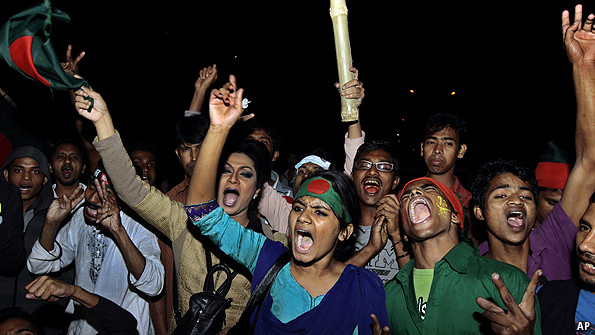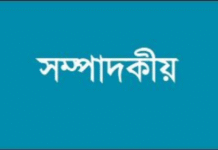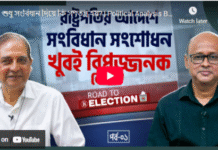
ALMOST 42 years after the end of its war of secession from Pakistan, Bangladesh has executed the first man to be convicted of atrocities committed during the conflict. Abdul Quader Mollah, a leading member of the Jamaat-e-Islami, Bangladesh’s biggest Islamic party, was hanged at the main jail in Dhaka on December 12th.
The evidence on which the country’s International Crimes Tribunal (ICT) convicted Mr Mollah was flimsy. The charge for which he hanged, of killing six members of one family, was based on the testimony of a single witness, who was 13 at the time and was apparently hiding under a bed nearby. There was no corroborating evidence. In the years since, Mr Mollah became known as the “Butcher of Mirpur”, but whether he was guilty of these murders or others may never be known.
In February Mr Mollah became the first defendant to be sentenced by the war-crimes court, not counting another the court tried in absentia. Despite its name the court is a domestic tribunal set up in 2010 by the Awami League (AL), the party of the current prime minister, Sheikh Hasina. The initial sentence handed down would have spared Mr Mollah’s life. But it triggered massive protests demanding that he, along with others accused of war crimes, be hanged. The suspects included nearly all of the Jamaat’s current senior leadership, some of whom still await sentencing. The protesters also demanded the banning of the Jamaat, which sided with Pakistan’s army in 1971.
Now they have got what they wanted. On September 17th the Supreme Court upgraded Mr Mollah’s sentence from life imprisonment to death. And in November the election commission confirmed a court ban stopping the Jamaat from taking part in elections next month. These elections will enfeeble the ICT, which would not survive a change of government: four prosecutors and the head of the court’s investigation agency have already applied to be candidates with the AL, even while they continue to serve in their current roles.
In an environment where everybody assumes the judiciary to be the handmaiden of the executive, it was natural for foreign notables to try and change the Supreme Court’s verdict. On December 11th the UN’s secretary-general, Ban Ki-moon, and America’s secretary of state, John Kerry, both called Sheikh Hasina to try to sort out this new mess. The execution of Mr Mollah, they knew, would result in further bloodshed. Almost 300 people have already died in political violence since the start of 2013, many as a direct result of the clashes that tend to mark decisions by the ICT. In the same stroke the court would dash whatever hopes persisted that the next elections will be credible. But Sheikh Hasina does not do compromise.
The political meaning of the execution is unmistakable. The government is determined to push through the elections, which it has scheduled for January 5th, in spite of the opposition’s boycott. The Bangladesh Nationalist Party (BNP) and 17 smaller opposition parties are refusing to submit any nomination papers to the election commission. This week the government offered 60 seats to Mohammad Ershad, a former dictator and the leader of the Jatiyo party, the third-largest in the country. That would be his reward for taking part in an election that is shaping up to be a sham. He did not take up the offer, though, pulled out of the election, and then on the night of December 12th was led away from his home by security forces.
Above all, though, Mr Mollah’s execution is a slap in the face for the UN and its effort to break the political deadlock in Bangladesh. In January 2007, when the BNP was in government and it was the AL’s turn to announce a boycott, the UN warned that if Bangladesh’s army were to provide security for a dodgy election, this might “have implications” for its lucrative involvement in UN peacekeeping contracts. The implicit threat had an immediate effect. By the time the sun rose on the UN headquarters in New York, Bangladesh’s generals had forced the then president to declare a state of emergency, cancel the election, and install a military-backed caretaker government.
That had not been the UN’s intention. This time around, it has tried a more enlightened approach. The goal had been to find some way of creating a fair arena for the opposed candidates, such that both of the main political parties would take part. With that aim, the UN’s assistant secretary-general for political affairs, Oscar Fernandez-Taranco, had come to Dhaka on December 6th to hold talks with the leaders of both parties.
Mr Fernandez-Taranco left Dhaka with a few hopeful words about the prospect of deferring the elections. Hours later, Mr Mollah had been executed. With him died the hopes that Bangladesh might come to terms with its violent birth without spilling more blood. Amnesty International warned that vulnerable groups, and the Hindu minority in particular, might be made the targets of retaliatory attacks.
Source: The Economist










Contemptuous refusal to pay heed to UN SG and EU’s request has brought about a serious threat to Bangladesh’s image as a ‘sovereign, independent’ country and China has explicitly said it. Now Bangladesh stands alone, we are afraid, only to be basketed by our big neighbor. We shudder with the impending consequence of any kind of sanction against Bangladesh as many political and international affairs analysts are apprehensive of. It’s mind-boggling how a party coming to power with overwhelming majority could act like a dictator worse than any known one in history. We are in great doubt if we are in a democratic country or an empire ruled by an empress.